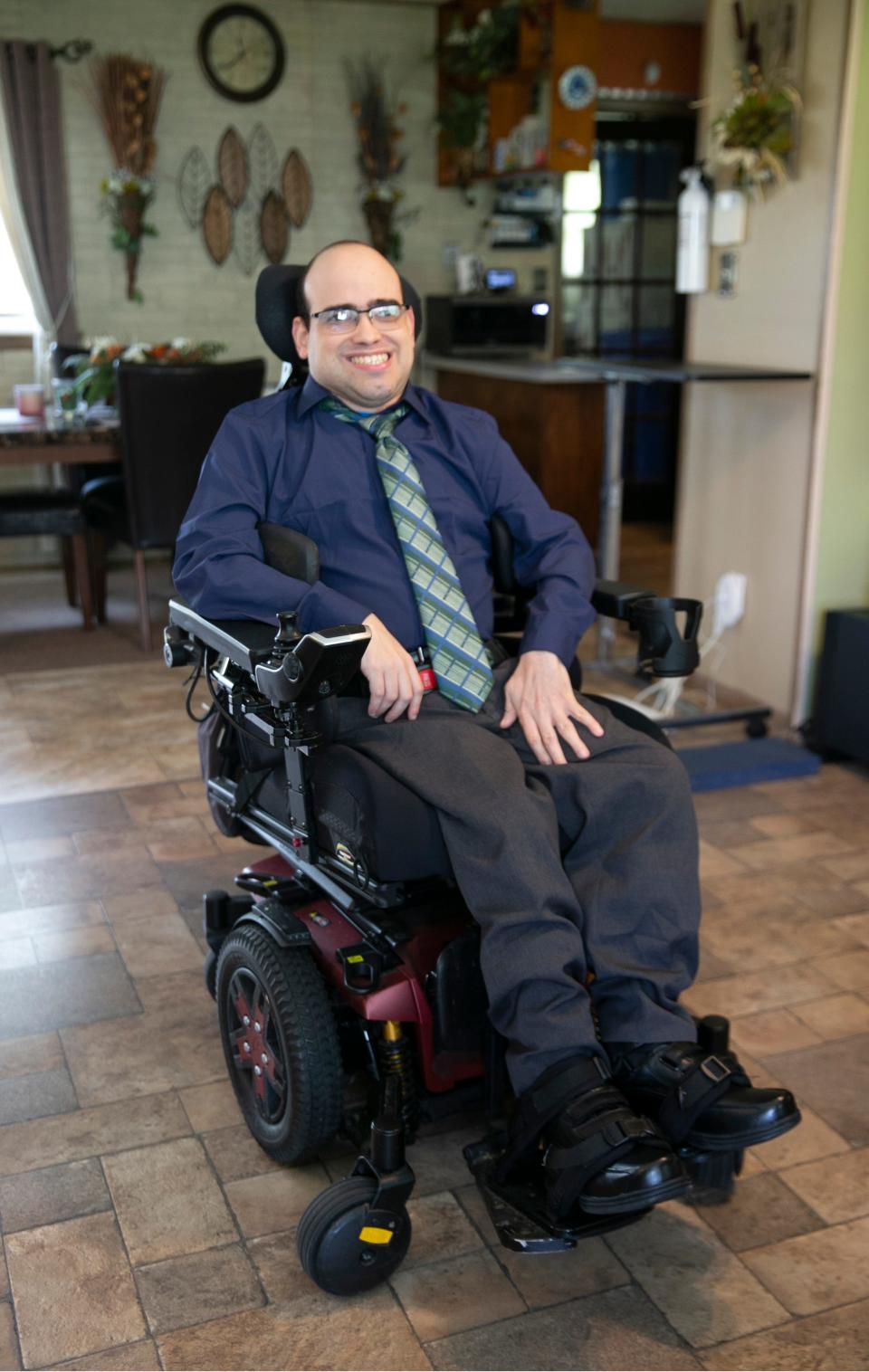Left behind in school evacuations, students with disabilities demand more protection in NJ
With mass shootings on the rise nationwide, local school officials are confronting a unique challenge for one of their most vulnerable populations: how to ensure the safety of students with disabilities.
In New Jersey, that has prompted new legislation ordering districts to take the needs of students into account, amid tales of children left at the top of staircases or told to hide on their own.
Willingboro's Kevin Nunez, whose cerebral palsy necessitates a wheelchair, is 35. But he still remembers the fear of waiting by himself two decades ago while his fellow Bridgewater-Raritan Regional High School students evacuated without him during shooter drills.
“When I was in school, my evacuation plan was to wheel myself into the ladies’ bathroom, pull into the handicapped stall, which was the only place big enough for my power wheelchair, and turn around with my back to the door," Nunez, the vice chairman of the state's Council on Developmental Disabilities, recalled in an interview.
"They told me that if a shooter came in, the bullets would have to go through the metal door and my wheelchair before they hit me. I was told to wait there, alone, in the dark."

School officials say they're trying to be proactive. Whatever happened 20 years ago, Bridgewater-Raritan Regional School District Superintendent Robert Beers said that today, "current district safety and security plans are developed to ensure that we account for the safety of our students with disabilities."
But Nunez and other advocates say most districts haven't prepared nearly enough to help these kids during lockdowns or evacuations. In New Jersey alone, there are 241,000 K-12 students with disabilities whose needs must be better addressed, said Brenda Considine, a researcher for the state Council on Developmental Disabilities.
New Jersey schools have been required to have security plans and hold drills on a regular basis since 2011. But the state guidance, which lays out 91 specific elements of planning, mentions disability only once, vaguely requiring schools to “assist the special needs population.”
Run, hide and fight?
The "run, hide, fight" strategy recommended by the federal Department of Homeland Security can be problematic for students whose disabilities make all three options a challenge.
That's Blackwood resident Monique Powell's concern. Her 9-year-old son has autism, and noise and chaos can trigger people on the spectrum like him, she noted.
Rare care: Bergen school starts rare after-school program for kids with disabilities
More: Why is it so hard to find a male therapist in NJ? Counselors say gender gap is hurting men
"If something happens, I don't know how he will react to it, because one of his issues is loud noises," Powell said. The fact that her son is non-verbal is an added concern.
"I viewed my son's evacuation plan, and there's nothing that says they use visuals or anything like that to help those children who are non-verbal to evacuate from the school," she said. "What if something does happen?"

It’s a worry that East Orange resident Safiyyah Muhammad knows as well. Three of her sons are on the spectrum. Her middle son, now 24, attended a school in the South Orange-Maplewood School District that specializes in teaching autistic students. It had an emergency plan tailored to their needs.
The public schools her other children attended didn't, Muhammad said. Decisions about students with disabilities were made on the fly.
“I remember a student being in a wheelchair during a fire drill, being taken in an elevator. I asked, ‘Why are you all using the elevator?’ And they said, ‘We don't have any other way to get the student downstairs.’”
Lawsuit says student was left behind
In 2017, the Watchung Hills Regional High School District settled out of court over a lawsuit that alleged it violated the Americans with Disabilities Act by failing to evacuate a student with a mobility disability during a fire alarm, according to a statement from the U.S. Attorney's Office for New Jersey.
Watchung Hills Regional High School had two students who used wheelchairs enrolled in classes on its second floor and had no plan for evacuating them in emergencies. It didn’t allow the students to fully participate in safety drills and didn't train staff in how to help them if something went wrong, according to the settlement agreement.
When an “unplanned fire alarm” sounded through the hallways on Oct. 7, 2014, the school’s security director told students to evacuate, using the PA system, and students without disabilities made their way out of the building. But the school's elevator was shut down for the evacuation, trapping the wheelchair users on the second floor.
Some students without disabilities waited with their schoolmates until an adult ordered the other kids to “evacuate the building and to no longer wait with the students with disabilities,” the settlement states. The school did not evacuate at least one of the wheelchair using students until the "all-clear" signal was given. The parents sued to force the school to develop plans for students with disabilities.
The school district referred NorthJersey.com and the USA Today Network to its 2017 statement on the settlement, which said it took exception to "allegations of discrimination," adding that it has taken "proactive actions to address the issue, including creating areas of refuge and updating the crisis management plan."
Call boxes and wheelchair sleds — designed to carry non-ambulatory students down flights of stairs — can now be found on its second floor, and staff members are trained to use them. The district also updated its crisis management plan to include students with disabilities and said it provides annual ADA training for all employees and contractors interacting with students.
About 15% of the nation's public school population — 7.2 million students in all — have physical, behavioral or sensory disabilities, according to the U.S. Department of Education. Their needs must be considered as well in school security plans, advocates said.
How schools can do better
In response, the New Jersey Council on Developmental Disabilities adopted a white paper outlining emergency preparedness concerns that came out of a summit it hosted in 2017. Educators, school administrators, advocates and emergency personnel came together to discuss how to develop more inclusive emergency plans.
The council recommended that students with disabilities participate in emergency plans and drills tailored to their needs. Parents, educators and first responders should collaborate with disability advocates, and the plans should be evaluated regularly. Training should include all school staff across disciplines.
A bill in Trenton, S2057, would require districts to amend emergency plans to include students with disabilities in monthly fire and security drills. It would also mandate staff training on accommodating disabilities. A law enforcement officer would have to be present for at least one drill per school year to assess the procedures.
The legislation would also require emergency planning for individual students with disabilities to be documented in their health care plans, 504 plans and Individualized Education Plans.
The bill has passed the state Assembly and is scheduled for a vote in the state Senate on May 22, according to the office of state Sen. Shirley Turner, who co-sponsored the legislation with fellow Democratic state Sen. Linda Greenstein.
Incorporating safety concerns into the students' Individualized Education Plans is a smart move, said retired Jefferson Police Chief Kevin Craig, a member of the state's School Security Task Force who has reviewed the legislation.
"There's a lot of advanced planning that goes into accommodating students for their educational needs," Craig said. "If we incorporate this emergency planning into the processes that already exist, it really simplifies it."
Gene Myers covers disability and mental health for NorthJersey.com and the USA TODAY Network. For unlimited access to the most important news from your local community, please subscribe or activate your digital account today.
Email: myers@northjersey.com
Twitter: @myersgene
This article originally appeared on NorthJersey.com: NJ school safety drills: Who helps students with disabilities?

